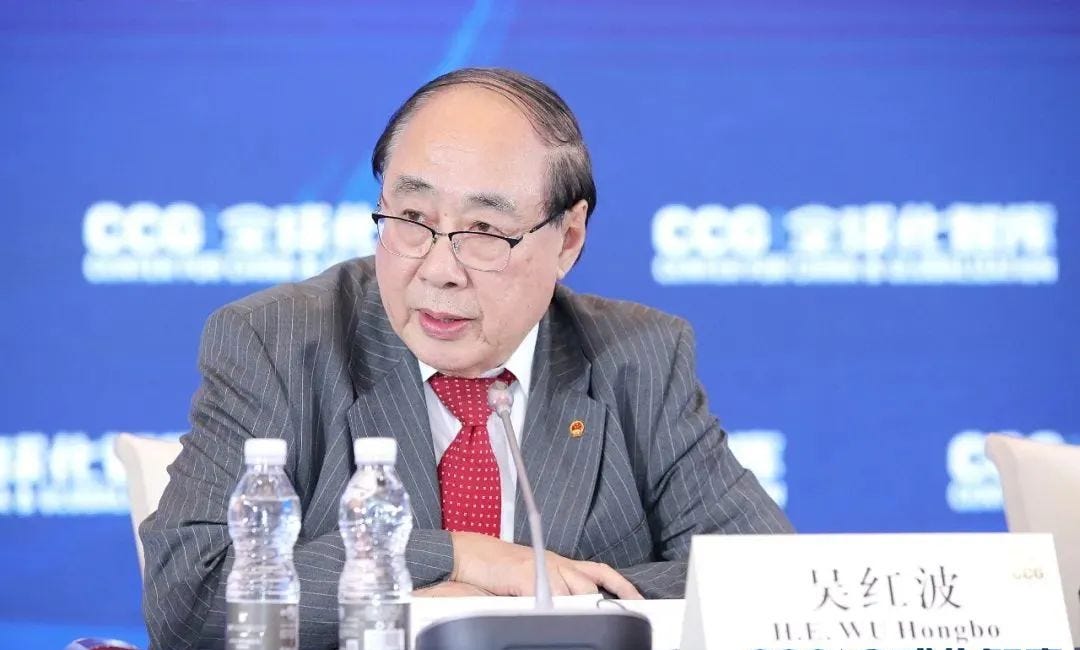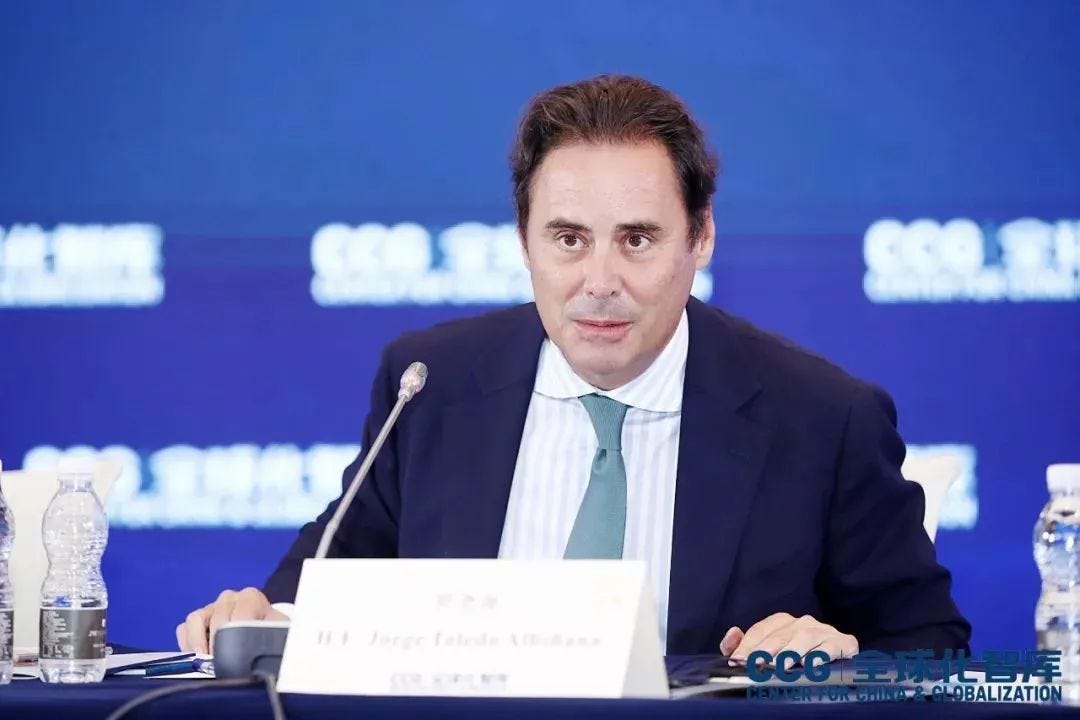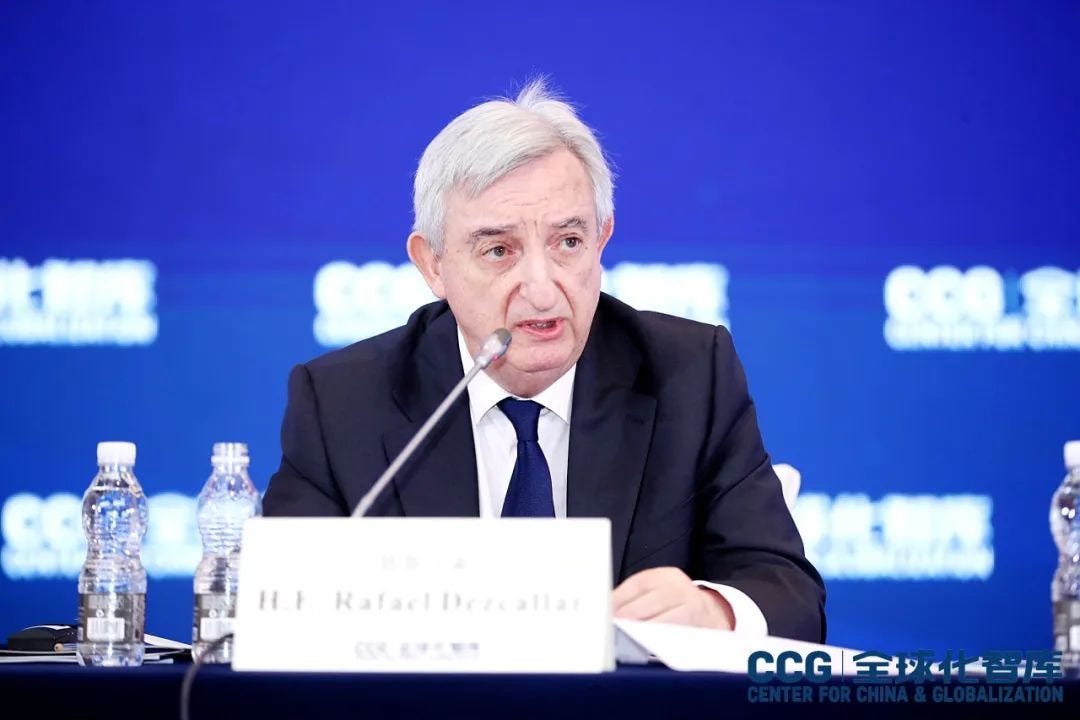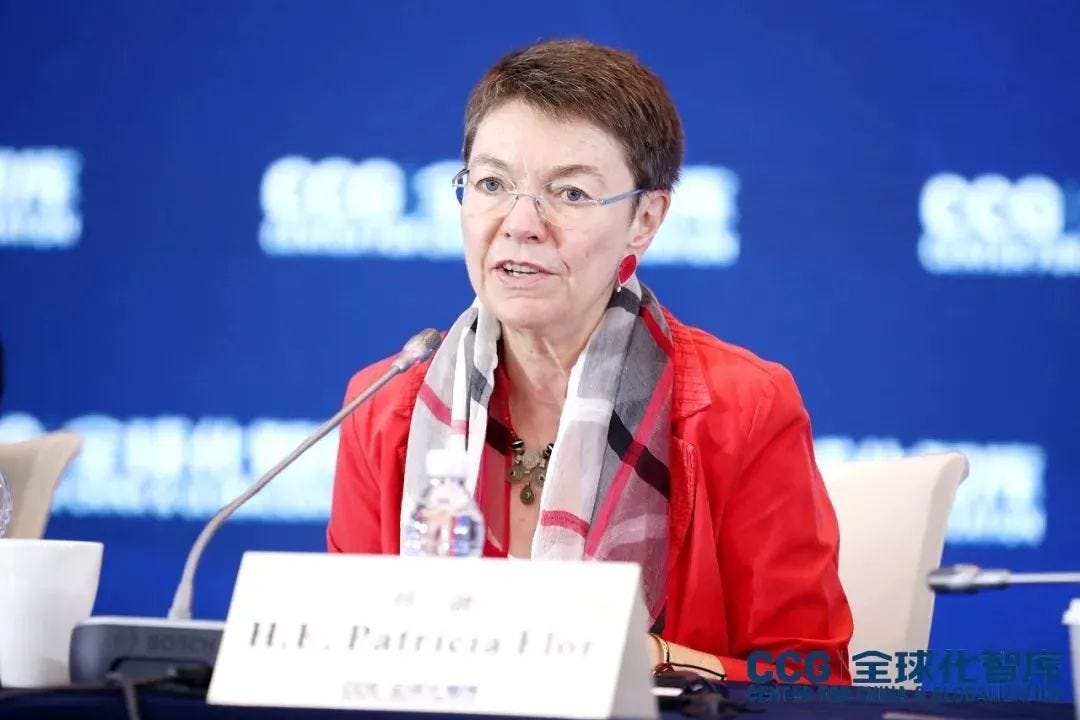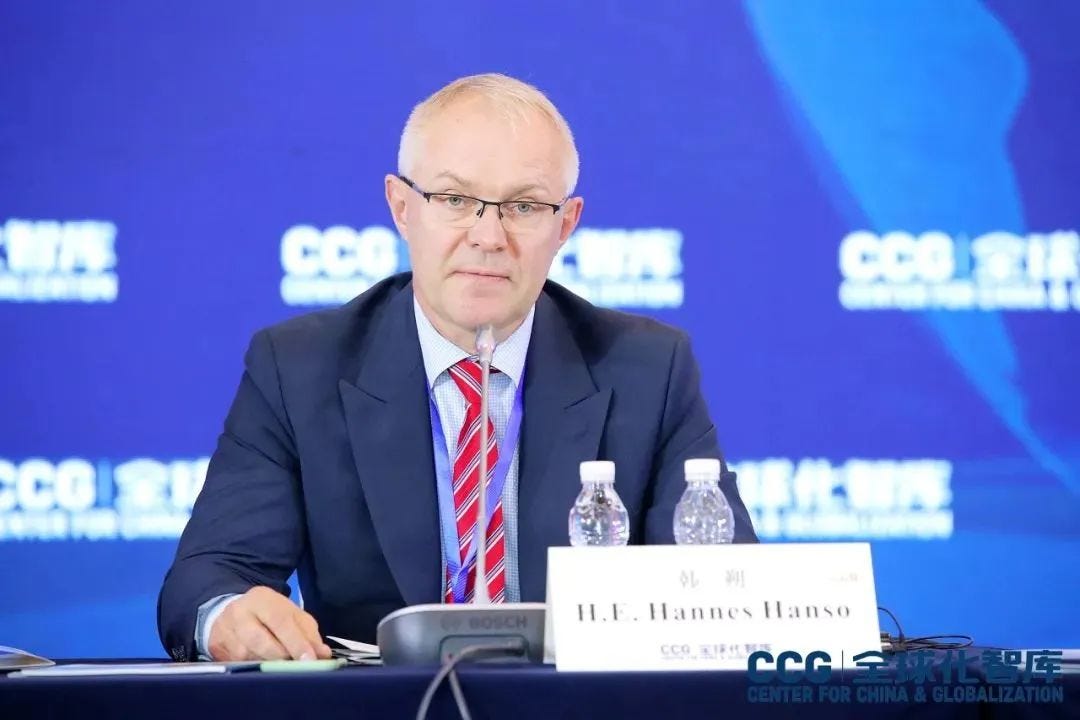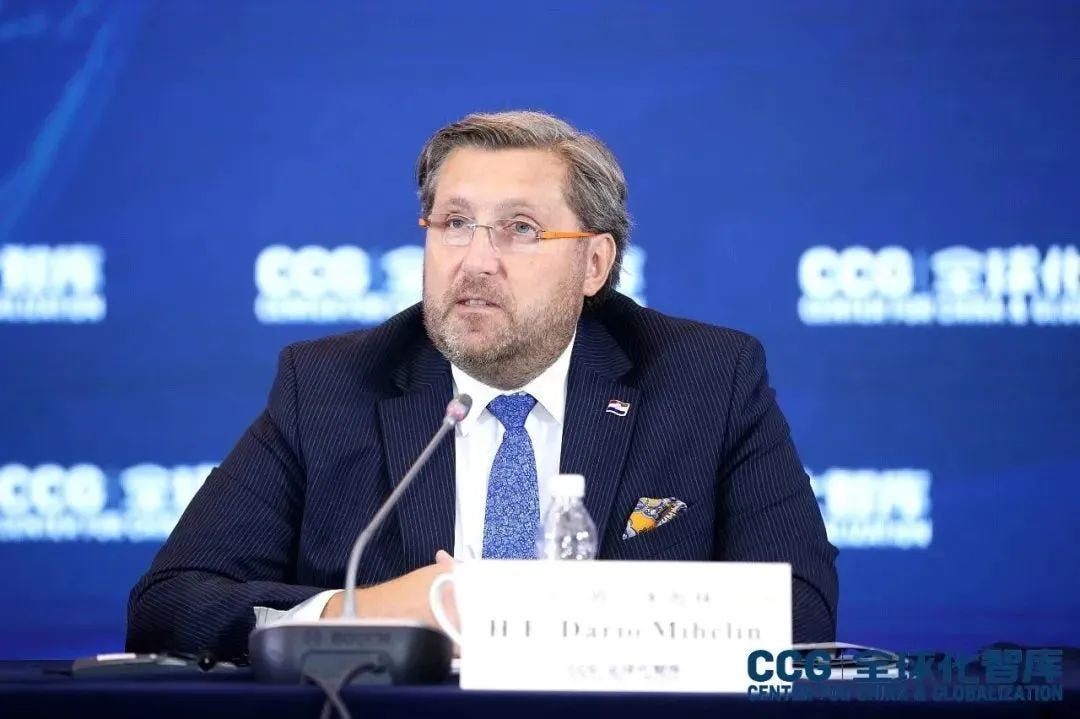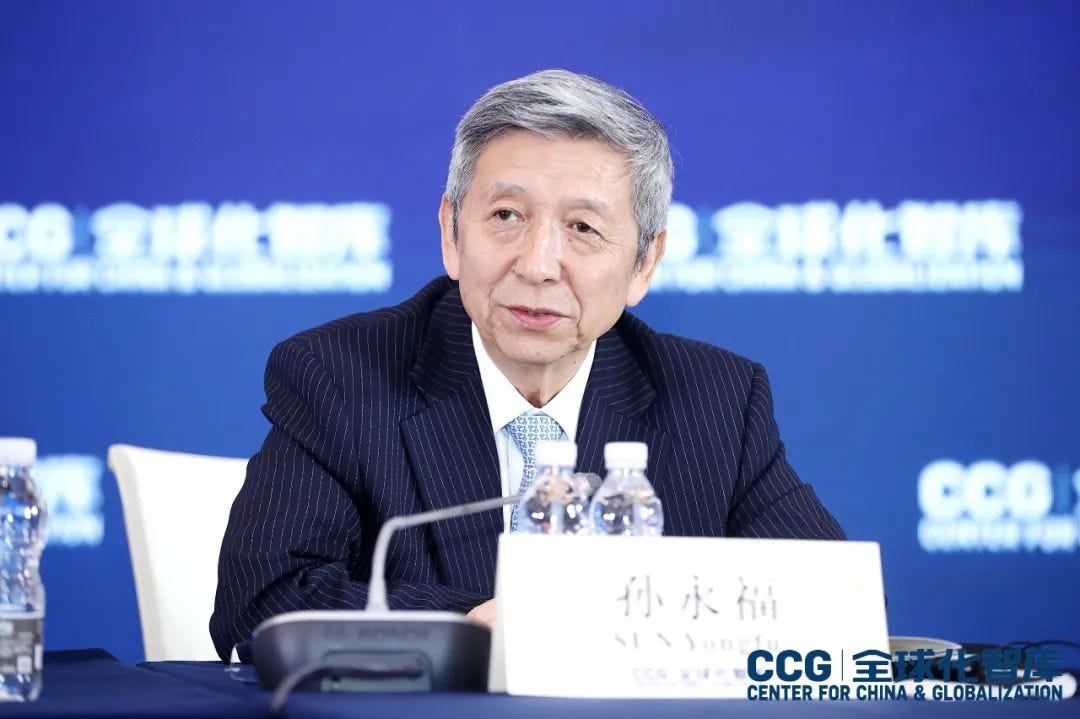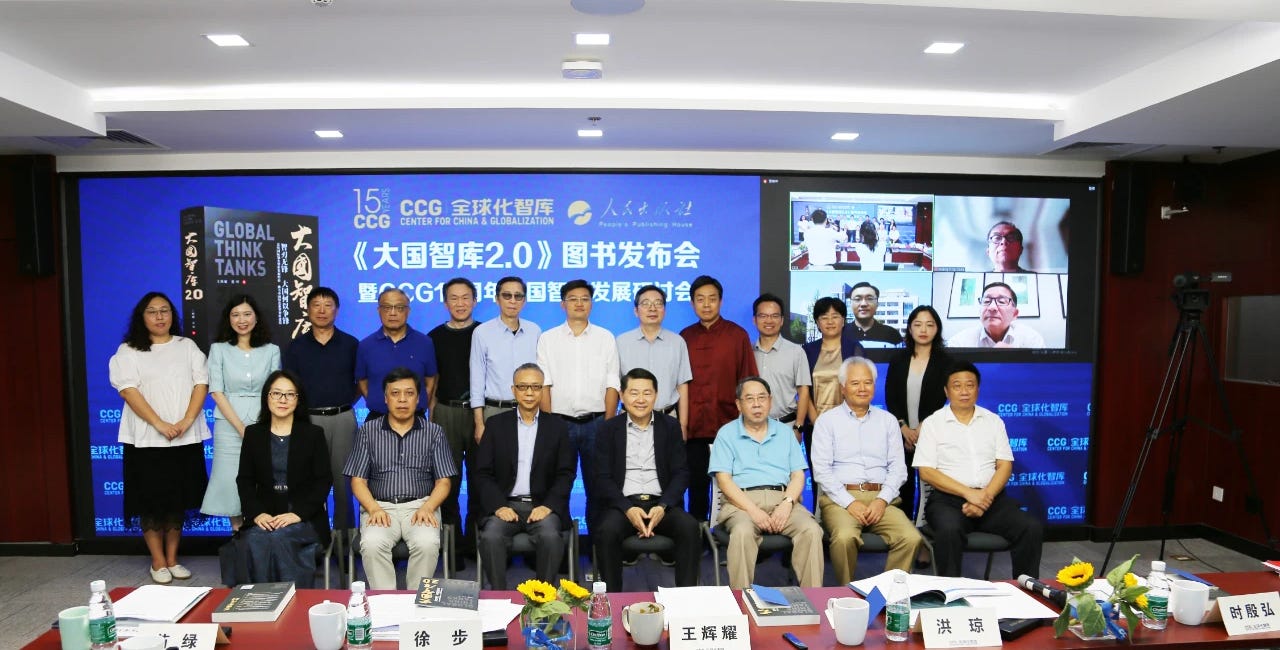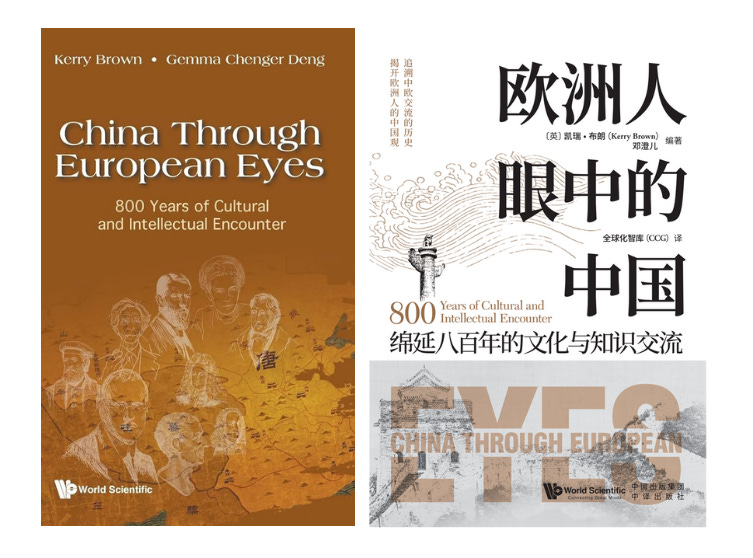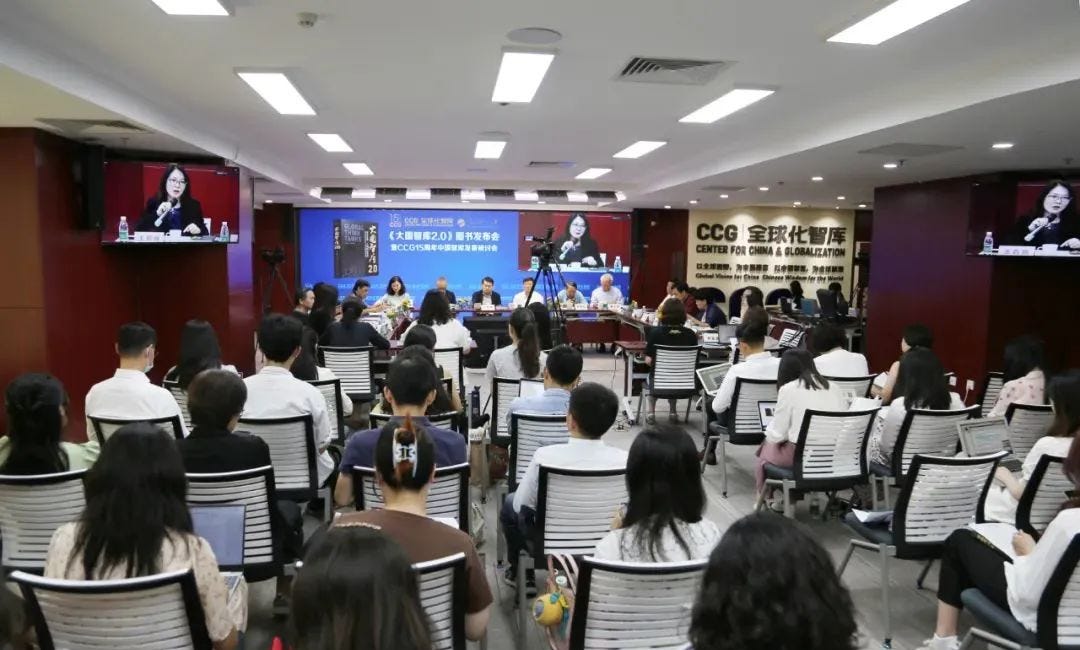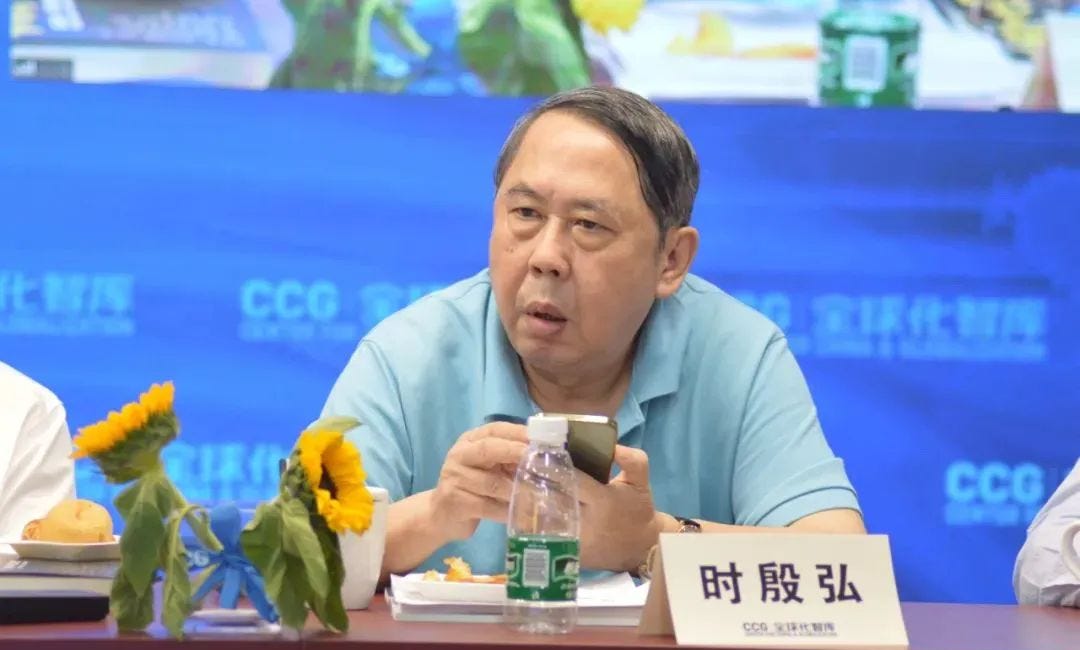China-EU relations in face-to-face discourse: concerns and hopes amid growing uncertainties
EU, Spanish, German, Estonian, and Croatian ambassadors in Beijing engage with Chinese counterparts on war and peace, trade and competition, connectivity and derisking.
On September 21, 2023, Wu Hongbo, Special Representative of the Chinese Government for European Affairs, engaged in an in-depth dialogue with a group of European ambassadors in China, as well as Sun Yongfu, former Director-General of the Department of European Affairs, Ministry of Commerce in China.
This was part of the 9th China and Globalization Forum hosted by CCG, which also celebrated CCG's 15th anniversary.
The speech and Q&A by Special Representative Wu Hongbo has already been published on CCG Update. See below the speeches by European ambassadors and former Director-General Sun Yongfu. The following texts are transcripts of live recordings and have not undergone review by the respective speakers or their staff.
Jorge Toledo, the EU Ambassador to China
Thank you, Henry. You are making me work very hard. Yes, in my 59th birthday, but I like my job, so thank you very much for giving me this opportunity. I can only start by saying that I can only agree with Ambassador Wu Hongbo with his last words. Let's work together. Let's have a dialogue. Let's engage. And that's what we're doing.
In fact, I said it before. We upset it many times. And that's not the important thing. The important thing is that the European Council, in his in the last meeting in June, confirmed, ratified that the European Union and China have a three faceted relation. We are partners, we are competitors, and we are systemic rivals. This does not intend to be a strategy. It is a description. Whether you like it or not, that's how we feel our relation with China is And it is a description. It's not an aim. We would love to be partners in everything, but I, as you will hear, from me, very briefly, there are issues in which we disagree, that are issues in which we compete, and there are issues in which we disagree.
From a systemic point of it, that's why we call ourselves systemic drivers. But we are, there are issues. And we just spent the whole mornings and talking about them about one of the most important fighting against climate change. And there we are strong and constructive partners. In any case. And that's where I agree with Ambassador Wu Hongbo, dialogue to work together is the method to address all these issues, even where we have a systemic rivalry. Because our aim is to have a constructive and stable relation with China, which is the largest country in the world, the largest market in the world. So we need to have a constructive and stable relation with China, and we want it to be based in the respect for international public law, sometimes called rules-based international order, balanced engagement, transparency and reciprocity.
So I already spoke, we spend the whole morning talking about our partnership in climate change. Is a partnership that extends to protection of biodiversity, which extends to anti pollution measures. But if we wanted to extend it to global health, a fight against pandemics and many other global issues, where without a good corporation and partnership with China, nothing useful can be done. We are also competitors and when we talk about competition, we don't mean the same as our good friends, the Americans. We are allies of the Americans. We are not necessarily aligned in everything. And in fact, the Americans call the relationship with China one of competition. We say competition is one of the three facets of our relation with China. And when we win, competition is fair competition. We wanted to be a level playing field competition, a fair competition. And the main areas of these competitioners are, of course, trade and investment.
Very Recently, the European Union Chamber of Commerce presented very recently, as recently as yesterday, I think, the European Union Chamber of Commerce presented it's a new survey on China, where it identified over 1000 market access barriers, up from the 967 they identified last year. So we, and the President of the European Commission said it when she came here in April. We want a level playing field. China is a trade surplus with the European Union. Last year was the highest in the history of mankind. So we know that China produces very good quality at very good prices, no doubt about that. But it doesn't make sense that there are one more over a thousand market access barriers which don't create a level playing field. And it's getting worse. It's getting worse. So that's why we are holding, very soon, in a few days, a high level dialogue on economic and trade. Where we are going to ? We need to address this. And we need progress, because I'm afraid we haven't made much progress in the last three or four years. We need progress. It doesn't make sense to have this kind of trade balance, which is not only caused by good quality and good prices, but by market access barriers.
We in the European Union Ambassador, we, we have never talked about decoupling. We have not replaced decoupling by the risking. We invented derisking. In fact, it was adopted very recently by the US. We have always talked about derisking that now it's official. The president von der Leyen coined the term in her speech before she came to China. And what do we mean?
And we always meant that. We meant that there were two important events which made us decided that we need to derisk. One was the pandemic. We learned that we were too dependent on essential items to fight the pandemic, not only from China, but from other parts of the world. So we need to do something about that in case a new pandemic happens. And unfortunately, because of the Russian aggression on Ukraine, we had an energy crisis because we learned that we were too dependent on Russia. So we need to learn those lessons extract consequences. And the consequence that we extract it is that we need to derisk, not necessarily, and only from China, from anywhere where we have an excessive dependency on critical products and materials. So it has never been about decoupling. It has been about reducing dependencies and vulnerable abilities, including in our supply chains.
Derisking, I'm afraid, will never lead to decouple, but derisking doesn't need now that the European Union talks about it, a measures like the very recent inclusion of two very critical materials that are produced in the majority in China, germanium and gallium, that has been put in the Chinese export restriction list, is leading to derisk, but not because the European governments are doing anything. I'm talking to European big industries, they are all revising their supply chains to see where they have an excessive dependency from China, because they were shocked by the inclusion of these two elements. So derisking is happening not because we have coined it as derisking, but there is a real issue about derisk.
By the way, we have no important or relevant restrictions in the European Union about investment in China or investment from China. There is a debate about the need for screening investment or not. But we are not yet.
And as it was mentioned by Ambassador Wu Hongbo, when we talk about these anti subsidy investigation on EV cars, the only thing I can say is, 1st, it has been announced. It has not yet started. It will be fact based. It will be WTO compliant. We cannot presume what the result will be. And as the rule of law is one of the founding principles of the European Union, the court will be there for anyone to appeal if and when there is a result they some companies, or some, even some countries, find it is not fair.
So going to systemic rivalry, let me say two examples. We have a different conception, and a diverging conception, about human rights. We have a different narrative about human rights. We consider that human rights cannot be divided, or given priority, one from the other. And this. And we think that it is also because we are both signatories of the same international treaties. So we have the the Human Rights, all of them that are listed in the Human Rights Charter are universal and must be enforced. So we have a difference. We have difference system. And this is a diverging difference.
And 2nd one, the Russian aggression on Ukraine. We don't blame China for the Russian aggression of Ukraine, but we think, very strongly so, that China, as a permanent member of the UN Security Council, has to call and to press Russia like we do, like we have condemned the aggression and the annexation of somebody else’s territory, which goes against the most basic tenants of the UN Charter. So China, we believe, has to call on Russia to stop its war of aggression and immediately completely and unconditionally withdraw its troops from Ukraine. This is a fact we have a very good example our systemic rivalry. We are talking to our Chinese friends to make them understand that this for Europe, for the European Union, is existential. We cannot live with that. And this, I'm afraid, is tainting our relation with China.
But anyway, in all three aspects, dialogue is the way forward. Only this week, and we are reengaging and and holding intensive dialogues with Only this week, vice President of the Commission Jourova successfully held the high level digital dialogue. We will welcome Executive Vice President Dombrovskis the day after tomorrow. In fact, and not tomorrow, but Friday. I'm traveling to Shanghai to welcome him. And we will hold a high level dialogue in extremely important dialogue where we need progress with China. At the same time, we will welcome Commissioner Sinkevicius to hold a large number of dialogues, like environment, water, sea, etc, with China. And we hope, very soon, in October, high representative Vice President Borrell will beat China to all the very important strategic dialogue with his friend and colleague, Minister and Director, Wang Yi, coinciding with another commissioner Simpson, to talk about energy with his Chinese colleague. We even expect some more visits before we expect to hold the EU Summit, EU-China Summit, in Beijing before the end of the year for the first time in person. This is and will be good news.
Rafael Dezcallar, Ambassador of Spain to China
The EU and China are the two major trading powers in the world. They represent two of the most important world civilizations. The political and economic presence is significant in every corner of the world, including, of course, the Global South. This is why the relations are very important. This is also why decoupling between Europe and China is not an option.
In fact, we need to go together on many issues, like the fight against climate change, of course, cyberspace, global health, the pursuit of the sustainable development goals (SDGs), or the solution of crisis situations in different parts of the world, like Afghanistan or the Middle East. In all those issues, we must look for common ground and try to develop a positive agenda between the EU and China. If we make progress, the benefits will also be felt in many other countries.
At the same time, if we really want to improve our relations, we must try to understand the reasons why those relations have deteriorated in the last few years. Only by identifying those problems can we build a more solid foundation for the future. I will mention four of them.
The Russian invasion of Ukraine is a breach of fundamental principles of the UN Charter such as sovereignty and territorial integrity, which are at the core of China's foreign policy. Some aspects of the Chinese position regarding the war in Ukraine have not helped China's image in Europe. Faced with this aggression, the European Union had to react. Remaining passive was not an option. It would have only invited new aggressions in the future. Even countries with a long history of neutrality, like Finland and or Sweden, have felt threatened and decided to join NATO. That shows, by the way, that in the past, NATO had no expansion agenda. It never pushed Sweden or Finland to join it. It was the member countries themselves who decided to join it for their own reasons. NATO itself and the political and security relationship between Europe and the United States have been much strengthened by Russia's invasion.
All these changes send a strong message about what is happening today in Europe. It is a message which, unfortunately, the Chinese media do not seem to have understood yet. But if China cares about its relation with Europe, which I believe she does, it is important that she tries to understand it properly. China is not just any country. It is a permanent member of the Security Council and has a special relationship with Russia. This proximity can now be used for a good purpose. It is vital to put an end to Russia's invasion as soon as possible, ending civilians' deaths and stopping a war which is threatening the security of us all, including China.
China is in a privileged position to help achieve this goal. We expect that she will make it in its influence felt in order to advance towards peace. This could certainly affect our relations very positively. Even if we do not agree with all the 12 points put forward by China, we welcomed the fact that China has presented them. It is important that point 1 refers to territorial integrity, and that they also include a clear position against the use of nuclear weapons. It is also important that China sent a special envoy to talk to different parties, and that it's participated in the talks in Jeddah.
As part of that effort, it would be equally important that she increases her contacts with Ukraine. That includes, of course, the Ukrainian embassy in Beijing, which needs to have proper access to the Chinese authorities.
Another problematic issue in our relations is the Chinese desire to reform the international system, to adapt it to Chinese values and Chinese interests, as shown in a document published last week by the Ministry of Foreign Affairs. China's position on the war in Ukraine, or some of of issues concerning this whole China scene, may suggest some of the ideas that are behind this vision.
Her position concerning human rights is also a key aspect of it. Human rights are important, and not only for Europe. They're important because they defend human dignity, the dignity of each one of us against possible abuses. The value of human rights cannot change depending on local conditions. They are universal, not only because the 1948 Declaration proclaims it, but because human dignity is a universal value. It is, of course, necessary to consider the social, political, and cultural realities of different countries where human rights must be defended. However, those differences may not become a pretext not to defend them. Neither should they relativize their value, nor render them void of meaning. That could mean render also human dignity void of meaning. Human rights are also indivisible. Social, economic, and cultural rights cannot prevail to the detriment of civil and political rights, nor the other way around. With her important advances in the eradication of poverty, China has an important experience to share in the defense of many of these human rights.
For all these reasons, human rights should be regarded as a normal element in our relations. We should be able to discuss them without letting them become an apparently unsurmountable obstacle, like it has been the case in Xinjiang. It is positive that the EU and China have resumed their Human Rights dialogue. We must strive to give it a more useful and meaningful content.
A third source of trouble in our relations is the chronic imbalance in our trade relations, as explained by Ambassador Toledo. In the case of Spain, we have an even balance of trade globally, but have very unbalanced trade with China. And we are not at all an isolated case. That means that the problem is not that our companies are not competitive. The problem is the existence of access barriers to our experts and our investments in China. We need to establish a level playing field in which our companies in China can operate in the same way as Chinese companies operate in Spain.
In the last Boao Forum, the Spanish Prime Minister, Pedro Sánchez, asked for opening up the East so that the West doesn't have to close in on itself. If that does not happen, our trade relations will not be sustainable as they are today. As a big power, China should take responsibility for working to create global trade and investment relations which are beneficial for all parties involved. The 24 opinions published on August 13 by the State Council to optimize the business environment are very welcomed, but they have to be followed by concrete actions. Facts, and not only words, is what we need to know. We must work to create a more balanced relations, balanced in terms of market access, balanced in terms of national treatment so that all companies work under a common set of rules, and balanced in terms of value chain distribution so that diversification allows us to reduce the dependency on one single country.
Stronger presence of Spanish and European companies in the Chinese market could also benefit China. They could be of great help in the growth of the service sector and the expansion of domestic consumption. Both are important goals of the Chinese authorities who want to increase internal demand and deepen the internal market.
A word about derisking. While decoupling between the EU and China is not an option, many voices in Europe have suggested that derisking may be necessary. This idea has been criticized in China. In fact, what does derisking mean? It means eliminating excessive dependency in supply chains of strategic goods. It means taking into consideration security concerns at the time of making decisions on trade and investment. All this is something which, in fact, China has been doing for decades. I find it difficult to understand why should we be criticized for doing the same thing that China has been doing for so long?
Let me finally say that the full normalization of people-to-people contacts could help improve our relations significantly. Three years of COVID-19 restriction have created a psychological distance between China and Europe — and not only with Europe — that did not exist before. We must strive to overcome that distance such as Ambassador Wu Hongbo also proposed. We must resume the normal flow of businessmen, students, teachers, artists, academics, think tanks, journalists, and tourists. People-to-people contacts are essential to know each other better, to understand each other better, and therefore to work together better. This seminar, in fact, is a very good example of what should start existing on a much larger scale under the presence of people coming from outside China. If we want to improve our relations, we must tackle these issues. They are not easy, but they are fundamental. Together with development of a positive agenda on the issues in which we can cooperate with China, they may allow us to put our relations on a much sounder foundation.
Patricia Flor, Ambassador of Germany to China
First of all, let me congratulate CCG for 15 years of activities, and it's a pleasure to be here again this year together with you. I would like to share a few core messages, which might also help to illustrate to what was said by the EU ambassador and the Spanish ambassador, because Germany could subscribe to all of their points as they were presented to you.
So I'll give you a few core messages which illustrate how Germany deals with this situation.
First, we don't live in the same world which we knew ten or twenty years ago. And so geopolitical shifts and a changing world force actually all countries to adjust our policies. And while the EU and Germany and China enjoyed a very fruitful and mutually beneficial cooperation in the past, based on very stable relations, the question that we have to answer today is how we can preserve that strong foundation while acknowledging and managing our differences?
My second point is that in uncertain times, it is natural for any country and for every government to identify and manage the risks which exist to our national security, including our economic security. In the German case, this is why the government adopted the first ever China Strategy, which aims at presenting the means and the instruments by which the federal government can actually work with China, while not endangering our way of life, our sovereignty and prosperity, our security and partnerships with others. And let me emphasize here that we do all of this together with our European partners, for the sake of Germany and Europe, and not because any third party from wherever across a big ocean actually asks us to.
So, as the Chancellor Olaf Scholz himself has emphasized many times, the basic rationale of our China strategy is certainly not decoupling, which is neither desirable nor realistic, because our economies are strongly intertwined, and business interests continue, of course, to also ask for economic cooperation. But what we do need to do is to address the lessons learned, and here I quote, it's "the interruption of supply chains", it's "the closing down of travel by the the pandemic restrictions". And it is the lessons learned from the energy crisis, which followed upon Russia's war of aggression against Ukraine.
So it is inevitable that this will need to be factored into our policies. And that means we need to reduce critical dependencies globally, but including with them, China. And this is also why you see that there's a joint approach of Germany, the European Union, and others to strengthen our resilience, to not put all our eggs in one basket, but to make sure that we can survive any future crisis when it comes. And I would agree with my friend Rafael, that I can watch and observe here in China, that China is doing the same: localization, dual circulation, of course, having the objective of technological self-reliance, all very understandable and following the same logic that we have for our own policies.
So the question that follows is, how do we create the space and maintain the space for cooperation? Because, and this is my third key message, global challenges need global solutions through cooperation by all, and among those all, obviously the big blocks, the big major powers. And so here, I do see a lot of opportunities. SDGs, as mentioned by Ambassador Wu Hongbo; climate was discussed this morning; environment, food security, energy security, peace and stability; and on all of these topics, China is, for Germany, an indispensable partner. And it also has a special responsibility as a member, a permanent member, of the UN Security Council. But also, of course, it's the biggest CO2 emitter at this point in time.
And so while we need strong dialogue, for instance, on human rights, on issues where we disagree, where we have different views, we also need to manage these areas well. And let me talk here about one very sensitive area, which is peace and stability. It is very sensitive and essential for any country. And therefore, we actually would look for working with China on peace and stability, in the sense of disarmament talks, in the sense of looking for risk reduction mechanisms which work both between China and Europe, but also between China and the U.S. Also, we would support engagement in order to avoid any unintended escalation, and we would certainly also want to engage deeper in a discussion about the law of the seas and what it means in different regions of the world with regard to unresolved conflicts there.
On Ukraine, let me echo what was said. So we welcome Chinese engagement for peace. But as the Chancellor just said at the United Nations in New York, for Germany, and I'm sure for all of us in Europe, we cannot accept a fake peace. We need a just and sustainable peace in Ukraine, and that means restoring sovereignty and territorial integrity of Ukraine in its internationally recognized borders, which China actually also guaranteed in the 1994 Budapest Memorandum.
Now, going from a difficult sphere to climate. Germany and China have already agreed. So we have already actually gone to action from talking. So add our intergovernmental consultations in summer, the German Chancellor and Prime Minister Li Qiang agreed on a climate and transformation dialogue in order to come to concrete cooperation on the ground, on hydrogen, on renewable energy, and on many other issues.
My final point is, it's not only countries that need to adjust, but it's also the global framework. It needs to be adjusted to this changing world, and I would agree again with the Ambassador Wu Hongbo, under the umbrella of the United Nations and the system which falls under that. So we would look towards discussing with China, working with China on, for instance, common rules, multilateral efforts to develop high and binding standards for responsible use of emerging and disruptive technologies, including AI or other areas in this respect. We would look for discussion with you on digitalization and data transfers: how do we create data security while ensuring data transfer? And we would also look forward to work with you in the area of health, for instance, on a pandemic treaty, which hopefully would empower all of us, all countries around the world, to do better, together with the World Health Organization in fending off the next pandemic. And I would absolutely agree that we need more contact, more engagement, also between the people. So civil society engagement across borders is equally important as well as—and I am not going into depths into this—is a level playing field, and free and fair trade in a globally free and fair economy.
Thank you very much. And let me say, in closing, open transparent dialogue, fair competition, cooperation is key to master the geopolitical, economic, and climate risks of our times.
Hannes Hanso, Ambassador of Estonia to China
The title of the session is "China-EU Cooperation in Uncertain Times". Before coming here, I was trying to figure out for myself what that term "uncertain times" mean. So let me define it for myself, and hopefully for you. For me, it is dangerous unpredictability in international relations, which also, of course, have an effect on EU-China relations. From my country's point of view, and I believe many of my European colleagues and other people attending here concur, the biggest risk and unpredictability affecting global peace and stability—and this also, as I said, already affects EU-China relationship—is the Russian aggression against Ukraine. This illegal and unprovoked aggression will continue to cause great international turbulence, severely and very, very negatively affecting development prospects in a wider world, not only in our region, especially in more vulnerable countries, including, of course, Global South. It affects adversely energy prices, food security, nuclear security, environmental cooperation that was focused on this morning, technology transfer, trade and investment, climate.
The only area that is not suffering in current war-infested environment is, of course, defense spending, as we all feel insecure and have to invest more. There's a question for everyone: is this right path to follow internationally? Therefore, all of the Russian illegal land grab simply cannot be allowed to succeed. Also, China, luckily, and I'm very pleased, does not recognize this imperially inspired actions.
International order, respect for the UN Charter must be respected by all, especially by P5 nations and nuclear nations. If we do allow, however, Russia, to succeed, as unfortunately we have allowed a number of times in the past, it will open a global Pandora's box. Other states could be encouraged to settle historical grievances, disagreements, also by the use of force. As a personal example, I come from a very small island in the Baltic Sea. Within the last five or six hundred years, this island, which is now, of course, Estonian, has been ruled by Germans, Danes, Swedes, Russians, not only, not by my good neighbor, the Finns. Just imagine if they all started laying claim again on the territory. What would happen? I think a challenge all of you to think about the places where they come from, who have these territories, these countries, these cities, these towns, these islands, these deserts, have been ruled by? If we open it, where is the end? We will all live in a permanent state of war on the planet. That's why it's essentially, existentially important for the whole world, also for China, also for Europe, for any country in the world.
So I think it is not an option, it is our duty to assist Ukraine in this war effort, in effort to liberate the sovereign country that was internationally recognized and support this country, Ukraine, with every possible way. We're very united in Europe. By doing this, by helping Ukraine, we fight against uncertainty, we fight against unpredictability. Some people, also in this country, challenges, and I say, our neighbor's house is on fire, what is a decent thing to do in a village? You have buckets, you have water, you have fire engines, you go and help. And we continue to do so. As many of you know, the EU has suffered greatly as a result of this war. Energy ties, a dependency had to be severed very quickly. Business relationships that were established for a long time and were really mutually beneficial, had to be cut. People-to-people relations have been all but cut. We regret this, but this is the right thing to do.
There are, regrettably, a number of countries in the world which continue to increase their trade with the aggressor, thereby, of course, financing the war effort. I do hope that this thorn in the side of the EU-China relations can be removed. We can then, when we now talk about the prospects, focus more on a positive agenda that is mutually beneficial relationship, cooperation, and trade, and environment, development, development issues globally. So this is my input for today. I thank you very much for listening.
Dario Mihelin, Ambassador of Croatia to China
I'm truly happy now to observe yesterday and today, compared to the last forum. And echoing what I said last year, that all of my colleagues present here and I are no longer ambassadors to Chaoyang, and that the dynamics of delegations that we mentioned is increasing daily. We still have to recover a lot of lost ground in past years. But this is precisely through more communication in person, more listening to each other, really hearing each other's sensitivities that we gain better understanding and find space for cooperation, so necessary into the turbulent world. And in that way, the only way we can rebuild mutual trust, as Ambassador Wu Hongbo mentioned in his remarks.
Our world has changed dramatically indeed, and in these new circumstances, there is no alternative but to increase international cooperation based in the established standards of the rules-based international order, buttressed by the global institution centered in the United Nations system and the coercion of international law. Unjustified Russian aggression against Ukraine reminds us of the importance of preserving this order, and demands a responsible response from everyone in the international community, particularly from the permanent members of the Security Council of the United Nations, calling for the respect of sovereignty and territorial integrity of Ukraine, and bringing about a just and sustainable peace with all the atrocities condemned and perpetrators brought to justice. Might cannot be allowed to be right, and the obsolete concept of sphere of influence should be banished to history.
True, and sadly so, as Sid [Siddharth Chatterjee, Resident Coordinator, United Nations] reminded and counted that yesterday, this is not the only conflict in the world today. There are many hot spots around the world. We should focus altogether on more with existential consequences for affected regions. But no other conflict brings more rampant challenges to the international community than this horrendous act by Russia. For Croatia, as an EU member state, enhance cooperation between the European Union and China on global issues such as global peace and security, climate change and environment, development systems, and the energy issues are of the utmost importance, as this is the UNGA high segment week dedicated to the Sustainable Development Goals this year. EU-China cooperation on their implementation should be stressed in particular.
We are all aware that the world today is facing the polycrisis mode, where serious crises in food, energy, finance, climate, environmental pollution, biodiversity, and such a combination of global crisis has not happened in a long time. Global consensus is growing that green and digital transition emerges as the only solution for a sustainable development. The EU, as a champion in these fields, is fostering strong cooperation with China, demonstrated by high-level dialogues taking place this month, working on the deliverables in the run-up to a summit later this year. China and the EU bear heavy global responsibility here as two strong pillars of our increasingly multipolar world. The development of renewables, investments in energy efficiency, and introduction of circular economy, along with the measures to abate the greenhouse gas emissions, will have to be implemented anytime soon, if we are to prevent the continued harmful effects of global warming witnessed this summer all around the world. Digital and green are twin transitions. The higher level of digitalization, with the introduction of new technological solutions, such as the one offered by the Artificial Intelligence, also helps reducing greenhouse gas emissions and negative impact on environment. It is crucial that we conduct digital transition in a way that protects universally established values and norms. In that sense, human rights, rule of law, and democracy must be held also in the digital sphere. Cybersecurity is another, not less, important feature.
The Russian aggression against Ukraine has confirmed that green and digital transition is even more important to increase our overall resilience—a valuable lesson not only for Europe. By further accelerating development of renewables and increasing green investments, diversifying energy sources, putting more emphasis on energy savings and green transition, we believe we can turn the current situation into new chance for our economies.
Nevertheless, this change has to be given in a fair environment, with level playing field, or a sort of economic business reciprocity. Exploitation of freedoms in other markets while fencing off your own is not a path to win-win outcomes. Win-win cannot be allowed to become a double win for some. Not surprisingly, security features these days as a prominent factor in various economic calculi. There is not a state in the world, China and the EU member States included, that is not trying to minimize risks and identify threats to its population and development. Derisking is basically universal, however you call it or not.
And let me close by a great example of China and the EU cooperation. Last year, we marked the 30th anniversary of establishment of diplomatic relations between Croatia and China. Our relations are truly friendly and solid. And that anniversary was marked with the opening of the famous Pelješac Bridge, connecting two parts of Croatia, connecting two parts of the European Union in that matter. And this bridge was built by a renowned Chinese company China Road and Bridge Corporation. And here I would really like to, let's say, categorize this project where it truly and correctly belongs, not to some other categories that is sometimes mentioned. This is a unique example of China-EU member state, -European Union cooperation, as this project was fully financed by the European Union and Member State Croatia and executed by a Chinese company. Croatia is open to business with China. We have just decided to award another contract to a Chinese company. But what I would really like to see: a level playing field in China, that Croatia companies can have such a stories of success here, and this is something what we should all work for.
Sun Yongfu, former Director-General of the Department of European Affairs, Ministry of Commerce in China
We have covered a lot of issues, from political issues, security, human rights and Russia-Ukraine conflict. I would like to, using a few minutes only discussing the economic and trade issues. And I was the Director General for European Department of a MOFCOM for a little bit more than twelve years. Fortunately, it was my time. It was the golden years of our bilateral economic and trade relations. But unfortunately, especially this year’s figure are not that rosy. I can provide a few data which is not really in line or in that rosy pictures, as our Ambassador Wu mentioned.
From the first month to August of this year, the bilateral trade between China and EU is, according to the Chinese statistics, that is 529 billion U.S. dollars, with a decrease of 9.8% in U.S. dollars, and that I haven't seen for at least 30 years. And our export to the EU is 340 billion decreased by 10.5 %; And our import from EU to China is 188 billion US dollars, decrease 2.5 %. So that was not bad if you compared our export to the EU. Our export to the EU has decreased, much more than what we imported from the EU. So we are changing the so-called unfair trade.
We are trying very much, as mentioned repeatedly by our President Xi and also by Li Qiang, and our door will be open, wider and wider. But on the contrary, a few days ago, the leaders of the EU announced the anti-subsidies investigation on the Chinese electronic vehicles. And I don't want to repeat the the announcement by our spokesperson of the Ministry of Commerce, but I do want to say it makes a lot of noise to those companies which are in line with the electronic vehicle sectors, those industries. And the response I heard from those, especially the German industries, Mercedes, for example, they do not support this idea of this anti-subsidies investigation, which the EU is going to have, I don't know when, but they have announced it. I personally don't think it's very healthy a signal to the HED, which is going to happen next Monday, the High level of Economic and Trade Dialogue. And because personally, I was involved at the very beginning, the setup of this HED, and we discussed, at that time, me personally and Mr. Li Ruiyuan — at that time, he was the DG of the European Department from the Minister of Foreign Affairs. And we had a discussion with Ambassador Abou at that time — he was the EU ambassador and also, the rotating presidency of the EU at the time was Portugal.
So there are three principles of setting up this HED, which is not weakened, and not replace and not repeat the existing dialogue between our two very important partner because we have more than quite a few dozens of different platform or dialogue channels at different levels -- minister level, vice-minister level, DG level. And so the principle of HED is not to repeat, second, not to replace, and thirdly, not to duplicate those existing dialogues.
What I'm worrying about is that very often, from the EU side, they put every single problem, especially the very technical problems, to the HED, which is aimed to solve the strategic partnership and discuss the big issues between China and the EU. So personally, I think, for the economic and trade issues, using that existing platform to discuss those issues, including this anti subsidies investigation issues, including perhaps the human rights issues. Because we have that dialogue. We have the the dialogue in between, I mean, the the Ministry of Foreign Affairs with the EU concerning human rights issues. So I personally don't want to see that the political issues have the very bad influence of our trade-related cooperation.
And decoupling is not the way, as mentioned by the EU leaders that they would like to see. But derisking is something quite important. But personally, I think that derisking doesn't mean decooperation. So we need to find further ways, and more areas of cooperation, but not to concentrate on those which has caused this systemic rivalry itself. It's mentioned again and again, too much. We would like to see more in the field of trade, in the field of investment, in the field of digital economy, and definitely green economy, low carbon economy, new and renewable energy sectors, including the wind and solar power. So we try to explore those new areas of cooperation, but not concentrate on the conflict itself. This is what I'd like to mention from the trade point of view.




